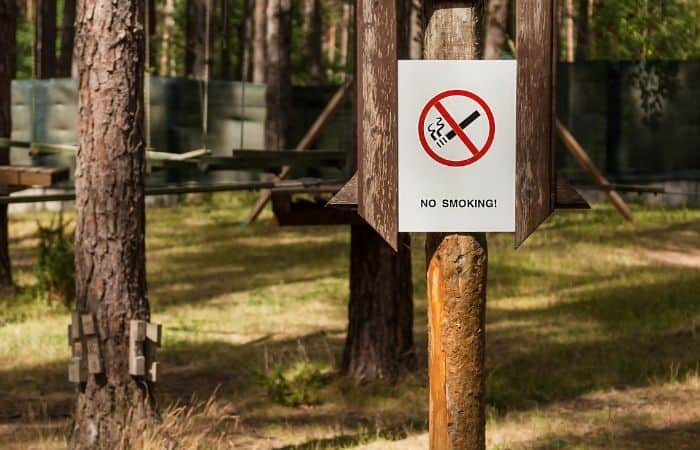Ninety-two million American households considered themselves campers in 2022, with 58 million who said they have at least one camping trip annually. Meanwhile, an estimated 28.3 million adults still smoke cigarettes in the country, and those among them who camp have found themselves frustrated by stricter smoking legislation.

For one, smoking has been banned in New York campgrounds, beaches, and parks owned by the state. The New York Governor and participating governors cited secondhand smoke and non-biodegradable cigarette butts as the reason for the new law. Disobedient campers face fines for using cannabis and tobacco, igniting debates about people’s personal choices while in the Great Outdoors.
This comes on the heels of Yosemite National Park, which sees 3.5 million visitors annually, announcing its new smoking bans. They restricted smoking camp-wide the same year as New York, only allowing smoking in enclosed personal vehicles and other selected areas.

With regulation closing in on more outdoor tourist spots, smokers may feel that the changes are unjustified; however, cigarettes pose more dangers than the obvious health-related consequences. But first, it’s crucial to talk about how cigarettes affect smoking and non-smoking campers alike:
Cigarettes and Campers
There’s no shortage of research on the damaging effects of cigarettes on the cardiorespiratory system, but the habit has specific implications for campers. Many national parks and mountainside campsites are located at high altitudes.
At these elevations, where there is less oxygen in the air, it is hard enough for the body to get enough to nourish and sustain its tissues and muscles. Smoking only increases this deoxygenation effect, which can have long-term health impacts.
Fun Outdoor Quiz

Scientific Reports findings of over 5,100 workers, 44% of whom were smokers, found that smoking increased the likelihood of not surviving in their 4,500 meters-above-sea-level (MASL) work environment. Plus, camping is a socially involved activity, and smokers should refrain from impeding the fresh-air experiences other campers desire.
Previous research found that 65.6% of people didn’t like people smoking around them, while 85% feared for their health when others did so. Another element that is affected by cigarette smoking is the flora and fauna encountered.
Cigarettes and Wildlife
Deforestation
The production of cigarettes is responsible for a whopping 5% of deforestation worldwide. Forests are cleared for tobacco plantations, and wood must be burned to cure tobacco, with one tree needed to produce 300 cigarettes.
Campfires, tents, and other items already impact soils and vegetation, and adding cigarettes to the mix may result in sporadic wildfires. Campers who use cigarettes need to take various measures to ensure a cigarette is fully put out, from stepping on it to using water.
Waste Pollution
Cigarette butts are the world’s most prominent type of litter, with four trillion cigarette filters being thrown out yearly. Improperly putting out or disposing of cigarettes on campgrounds can also damage the environment because their filters are made up of non-biodegradable cellulose acetate.

Almost a quarter of Addictive Behaviors study respondents believe that cigarettes decompose and are non-toxic, which is inaccurate. Campers must embody the “leave no trace” mindset, leaving nothing on the grounds that wasn’t already there.
Wildlife
Toxic chemicals like nicotine, cadmium, arsenic, and lead can leach out of cigarette butts and be consumed by curious but unsuspecting squirrels and other wildlife. Throwing butts in a nearby river doesn’t help, either, because nicotine dissolves quickly in water.
Fish exposed to toxic nicotine levels can lose their color, get rigid fins, or suffer from muscle spasms. Those who camp with their pets should know that smaller dogs and cats can even die from ingesting cigarettes. Thus, considerate campers can consider options that may minimize adverse health outcomes while keeping the camping experience enjoyable for all.
Tips for Campers Who Smoke
Due to rising concerns about cigarette-related issues on campgrounds and other wildlife-protected areas, the nicotine industry has moved away from cigarettes and other combustible tobacco products.
Introduction to Smokeless Nicotine Alternatives
In this vein, smokeless options have been made available; one popular example is the nicotine pouch, which can be taken orally for an unobtrusive nicotine consumption experience. One of the most popular brands is ZYN, which is designed with Americans in mind – especially those who do not like the taste of tobacco or who are trying to reduce their tobacco intake.
Campers can pack ZYN pouches before a trek to eliminate fire risks, beginning with ZYN Spearmint 6mg, which contains a nature-derived spearmint flavor. As these products come in various strengths, campers can opt for ZYN Coffee 6mg in the morning to mimic their morning tent-side caffeine fix.

Practical Applications for Campers
This alternative not only sidesteps the health dangers explicitly associated with cigarettes but also reduces harm to the plants, animals, and campers who don’t smoke. These pouches typically come with a catch lid so users can temporarily dispose of them first, then throw them away when they find a bin.
We’ve talked about the joy of improvised wilderness survival in our “Bushcraft vs Backpacking” post, where we mention activities that add joy to the camping experience. That said, even with nicotine consumption achieved through smokeless alternatives, campers who enjoy doing activities with their hands—pitching tents, building fires—may seek the familiar movements that come with smoking cigarettes.
Addressing Recreational Needs
To achieve this without inconveniencing non-smoking campers, Boy Vienna incense sticks contain sage, lavender, and rosemary aromas while looking nearly identical to traditional cigarettes. The filter side of the stick can be held safely or used to pick up burning incense. These alternatives give your hands something to do and may eliminate the unpleasant smell of cigarette smoke from other inconsiderate campers.
Combining Nicotine Pouches and Incense Sticks
The two options above might work when used in tandem; consuming nicotine pouches while using cigarette-like sticks could help mimic the cigarette smoking experience sans the specific health impact of cigarette smoke, tar, and carbon monoxide.
With more guidelines being lobbied for to protect the sanctity of America’s natural wonders, cigarettes continue to be pushed out into the periphery. The sustainable practices that dominate many popular commodities cannot be applied to cigarettes, the production and improper usage of which can cause serious harm to our favorite campsites. By packing suitable nicotine alternatives, observing proper disposal techniques, and being mindful of other campers, you can enjoy the fresh air outdoors sans cigarettes.









